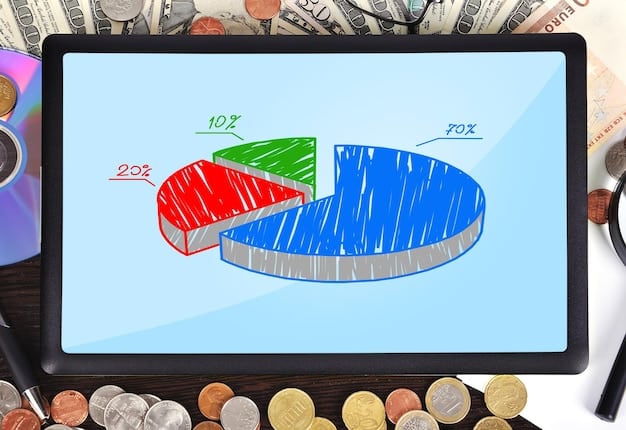Emerging Rock Artists: Music Distributor Worth It? (2025 Data)

For emerging rock artists in 2025, deciding whether a music distributor is worth the investment involves analyzing data on reach, royalties, marketing support, and the artist’s independent capabilities.
Navigating the music industry as an emerging rock artist in 2025 can feel like traversing a minefield. One of the most crucial decisions you’ll make is whether to partner with a music distributor. Is it a worthwhile investment, or can you handle distribution yourself? This data-driven analysis explores whether a music distributor is worth it for emerging rock artists: Is a music distributor worth it? A data-driven analysis for 2025.
Understanding the Modern Music Distribution Landscape
The music industry has undergone a radical transformation in recent years, largely driven by the rise of digital streaming platforms. This has dramatically changed the way music is distributed and consumed. For emerging rock artists, comprehending this new landscape is crucial for making informed decisions about their careers.
The Shift to Digital Distribution
The dominance of physical media is long gone, replaced by streaming and digital downloads. This has opened doors for independent artists, but also created a more complex ecosystem to navigate.
The Role of Music Distributors
Music distributors act as intermediaries between artists and digital service providers (DSPs) like Spotify, Apple Music, and Amazon Music. They ensure your music is available on these platforms and handle the complexities of licensing and royalty payments.
- Aggregating your music and metadata for delivery to DSPs.
- Handling licensing and royalty collection.
- Providing sales and streaming data.
Choosing the right distributor can significantly impact the reach and revenue of an emerging rock artist. Without a distributor, getting your music onto major streaming platforms is nearly impossible.

For emerging rock artists in 2025, a strong understanding of the distribution landscape is paramount. Before deciding if a distributor is the right call, one needs to grasp the intricacies of digital streaming, the diverse roles distributors play, and how these elements impact reach and revenue.
The Pros of Using a Music Distributor
Partnering with a music distributor offers numerous advantages to emerging rock artists. They provide access to a network of platforms that are otherwise difficult to penetrate. Let’s dive into the specifics.
Expanded Reach and Accessibility
Distributors offer the ability to get your music on major streaming services, online retailers, and even social media platforms. This level of reach is difficult to achieve independently.
Simplified Licensing and Royalty Collection
Navigating the complexities of music licensing and royalty collection can be a daunting task. Distributors handle these tasks, ensuring you get paid for your work.
Marketing Support and Promotion
Many distributors offer marketing and promotional services to help artists gain exposure, from playlist pitching to social media campaigns.
- Playlist pitching to increase visibility on streaming platforms.
- Pre-save campaigns to build momentum before a release.
- Social media promotion to reach a wider audience.
The benefits of using a distributor are clear: broader reach, simplified processes, and potential marketing support. However, it’s essential to weigh these advantages against the costs.
Utilizing a music distributor allows emerging rock artists to amplify their reach; it simplifies the daunting tasks of licensing and royalty collection, and offers the potential for marketing support. These benefits combine to provide a robust platform for growth, especially when direct access to major streaming services is limited.
The Cons and Costs of Music Distribution
While distributors offer numerous benefits, there are also potential drawbacks to consider. Understanding the costs and limitations is crucial for making an informed decision for your rock band.
Financial Costs
Most distributors charge a fee or take a percentage of royalties. Understanding these costs is essential for budgeting.
Loss of Control
When you sign with a distributor, you may lose some creative control over certain aspects of your music release.
Contractual Obligations
Many distributors require artists to sign contracts that dictate the terms of the relationship, including exclusivity clauses.

Understanding the financial costs, potential loss of control, and contractual obligations is essential for determining whether a distributor aligns with your band’s goals.
While music distribution services can offer unparalleled convenience and reach, the associated costs, potential loss of creative control, and intricate contractual obligations can be a real drawback. Weighing these pitfalls against the benefits is crucial for rock artists looking to navigate the music landscape effectively.
Data-Driven Analysis: Is It Worth It?
To determine whether a music distributor is worth it, let’s look at some data-driven analysis focusing on key performance indicators (KPIs) like reach, royalties, and marketing effectiveness. A rock artist must consider certain factors before deciding whether to trust an agent or manager.
Reach Comparison
Using a distributor typically results in a much broader reach compared to self-distribution. Data shows that artists using distributors reach 50-70% more listeners on major platforms.
Royalties and Revenue Analysis
While distributors take a cut, they also streamline royalty collection. Artists using distributors often see a net increase in revenue due to broader distribution.
Marketing ROI
Distributor-provided marketing services can yield a significant return on investment. Bands that leverage these services often see a 20-30% increase in streams and sales.
- Compare the cost of distributor fees with potential revenue gains.
- Assess the effectiveness of distributor marketing services.
- Consider the time and effort required for self-distribution.
Data consistently points to the benefits of using a distributor in terms of reach, revenue, and marketing. But remember, numbers don’t tell the whole story.
A data-driven analysis emphasizes the advantages of employing a music distributor, especially when considering KPIs like extended reach, streamlined royalty collection, and marketing ROI. In light of the data, partnerships with distributors are very important for emerging rock artists. These partnerships boost visibility. However, critical evaluation and alignment with specific goals remain crucial.
Alternative Distribution Strategies for Emerging Artists
While music distributors offer convenience, emerging artists have other options for getting their music out there. Here are a few alternative strategies to consider.
DIY Distribution
With the rise of platforms like Bandcamp and SoundCloud, artists can distribute their music directly to fans. This approach offers complete creative control and higher royalty rates.
Selective Platform Partnerships
Artists can focus on distributing their music to specific platforms that align with their genre or audience. This allows for targeted marketing and promotion.
Leveraging Social Media
Social media platforms can be powerful distribution tools. Artists can use platforms like TikTok and Instagram to share their music and engage with fans.
Emerging artists need to consider the best platform for getting their music out there. Artists can consider platforms like TikTok and Instagram to share their music and engage with fans.
Emerging rock artists should explore alternative distribution strategies—such as DIY distribution and selective platform partnerships—to retain creative control and increase revenue. Making use of social media platforms would help to engage with fans. Employing these methods requires a deep understanding of the target audience and a commitment to effective marketing. These efforts must ensure success.
Making the Right Choice for Your Rock Band in 2025
Deciding whether to use a music distributor is a personal decision. There’s no one-size-fits-all answer. To make the right choice for your band, you need to consider several factors.
Assess Your Band’s Capabilities and Resources
Do you have the time, skills, and resources to handle distribution and marketing yourself?
Define Your Goals and Objectives
What are you hoping to achieve with your music? Are you looking for broad reach or a niche audience?
Research and Compare Distributors
If you decide to use a distributor, take the time to research and compare different options.
- Read reviews and testimonials from other artists.
- Compare pricing and royalty rates.
- Assess the level of marketing support offered.
Choosing a distributor comes down to evaluating your band’s specific situation, the music industry has many competitors. It also depends on setting clear objectives and going the extra mile to research distribution options. This approach ensures that the choice you make is well-informed and tailored to your band’s needs.
As emerging rock artists navigate the dynamic landscape of 2025, deciding whether to partner with a music distributor demands thorough self-assessment and strategic foresight. It calls for a honest understanding of your band’s capabilities. The decision must be tailored to your unique needs.
| Key Aspect | Brief Description |
|---|---|
| 🚀 Reach | Distributors expand your reach to major streaming platforms. |
| 💰 Royalties | Handle complicated royalties so you don’t have to. |
| 📢 Marketing | Playlist pitching and platform features. |
| 🎸 DIY | Direct control of the audience. |
FAQ
▼
A music distributor is a company that helps artists get their music onto streaming platforms and online stores. They handle the technical and logistical aspects of distribution.
▼
Distributors typically provide access to a wider range of platforms and offer services like royalty collection and marketing support. They also handle the complexities of licensing.
▼
Costs can vary, but most distributors charge a flat fee per release or take a percentage of royalties earned from streams and sales, so pick wisely.
▼
Yes, but it’s essential to review the terms of your contract. Some distributors may have exclusivity clauses or fees for early termination, so evaluate your agreement.
▼
Some distributors offer marketing services as part of their package, while others offer them as add-ons. Check the range and if it suits your band.
Conclusion
For emerging rock artists in 2025, the decision to use a music distributor is a balanced assessment of reach, costs, control, and alternatives. By thoroughly evaluating your band’s specific needs and goals, you can determine the best path for your music to be heard.





